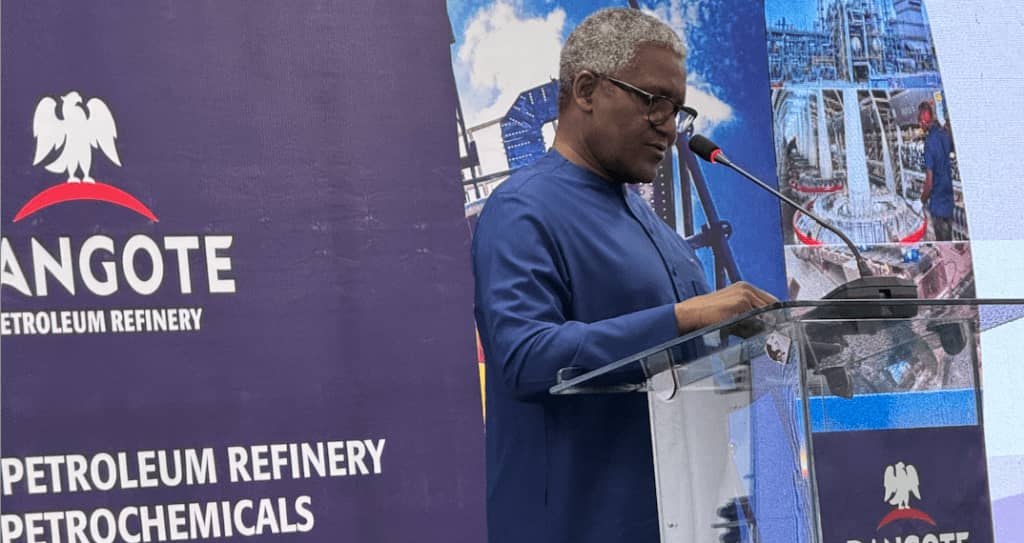Business
‘Dangote proposes five-year salary payments to sacked workers’

Fresh information has emerged on the negotiations between Dangote Refinery and the Petroleum and Natural Gas Senior Staff Association of Nigeria (PENGASSAN) after the recent dispute over the dismissal of workers.
Sources familiar with the talks revealed that the refinery proposed paying the affected employees’ full salaries for five years without requiring them to work, citing fears of possible sabotage if they were retained within the facility.
According to one source, the arrangement “would have allowed the workers to stay home or pursue other opportunities while receiving their monthly salaries for five years.”
Although government representatives at the negotiation table questioned the financial implications of such a deal, Dangote reportedly maintained it was less risky than keeping staff members it no longer trusted inside the refinery.
READ ALSO: Dangote’s new trucking firm writes NUPENG, says our drivers won’t join union
PENGASSAN, however, rejected the proposal and pushed instead for redeployment of the dismissed staff to other subsidiaries within the Dangote Group.
“Dangote offered to pay the sacked workers for five years to continue to stay in their homes, or do other things, but they will be paid every month for five years. But they will not be allowed to go near the refinery, because they are not sure of not sabotaging. So, Dangote offered to pay them without work.
“Even though the government representatives at the negotiation said that it may be too much of a burden on Dangote. Dangote, however, said that’s a lesser burden for him than for him to allow people who he cannot trust to be in his facility because he doesn’t want to compromise on sabotage. But PENGASSAN rejected it,” one of the sources said.
When contacted on Thursday morning, PENGASSAN General Secretary Lumumba Okugbawa confirmed that various options were debated during negotiations but stressed that the final outcome was what mattered most.
“So, the option that he wants to pay salary for five years without any work. I don’t think the option is important at the final stage. The most important thing is that what did you agree? That’s what you will do and not, what they disagree on,” he said.
Some sources suggested redeployment might not be favourable to all workers, noting they could be sent to distant locations, which might prompt some to resign. But Mr Okugbawa dismissed such concerns as speculative.
“Those are speculations, even if the union was not there and they transfer you, won’t you go to where you are transfered to and continue your job. I think Nigerians should look at the positive outcome of the negotiation, not the negative aspect.
“What union do after mediating is go back to their house and workers and the management will continue working together. It’s like you try to settle a case between the husband and the wife. After settling the case between them you go back to your house and the husband and wife will live together.
“So there is no need to create enmity between them at all. We hope to have good relationship and everything with Dangote refinery in the future. All we are interested in is our workers’ welfare. Dangote Refinery is losing no kobo and people should not think that we are interested in his business model. The most important thing is that these people have their jobs back,” he added.
Recall that Dangote Petroleum Refinery had earlier terminated the appointments of some employees, citing repeated incidents of sabotage that threatened safety and disrupted operations.
In a letter signed by the Chief General Manager, Human Asset Management, Femi Adekunle, the company notified staff that the dismissals took effect on 25 September.
“This exercise is not arbitrary. It has become necessary to safeguard the refinery from repeated acts of sabotage that have raised safety concerns and affected operational efficiency,” the letter read.
The company said the decision was essential to protect the refinery’s long-term stability.
Following the sack, PENGASSAN directed its members to halt gas supply to the refinery and later ordered a nationwide withdrawal of services in protest. The union accused Dangote of unfair labour practices and discrimination against Nigerian staff, which triggered federal government intervention.
Dangote Refinery responded by describing the strike order as illegal, warning that PENGASSAN had no authority to interfere with its third-party supply contracts. The refinery also called on security agencies to step in, insisting the union’s actions could damage the economy.
The crisis escalated with threats of a nationwide strike before the National Industrial Court in Abuja issued an interim order stopping PENGASSAN from cutting crude and gas supply to the refinery.
Talks facilitated by the Ministry of Labour and Employment and the Office of the National Security Adviser eventually produced positive results with management of Dangote Group agreeing to immediately start the process of taking the disengaged staff to other companies within the Group, which prompted PENGASSAN to suspend its strike.
(PREMIUM TIMES)






















